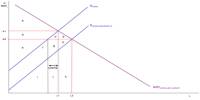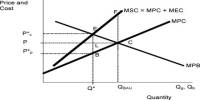The green national product (GNP) is an economic indicator that takes into account the environmental costs associated with economic activity. The GNP is an alternative to the traditional Gross National Product (GNP), which only measures the market value of goods and services produced in a country without accounting for the impact on the environment. GNP is an economic metric that attempts to incorporate environmental factors such as environmental degradation and resource depletion into a country’s GDP.
The GNP seeks to measure the economic growth of a country while also considering the depletion of natural resources, the damage to the environment, and the costs associated with pollution and other negative externalities. The GNP takes into account the value of non-market goods and services such as clean air, water, and ecosystems, which are not accounted for in the traditional GNP.
Criticism of gross national product
The gross national product (GNP) measures the well-being of a country’s economy by aggregating the goods and services produced in that country. Although GDP is an accurate measure of the size of the economy, many economists, environmentalists, and citizens have questioned its usefulness in measuring welfare.
According to Nobel Laureate economist Joseph Stiglitz, this standard measurement for any national economy has become inadequate as a measure of long-term economic health in the recently resource-driven and globalizing world.
According to critics, GNP frequently includes the environment on the wrong side of the balance sheet because if someone pollutes and then someone cleans up the pollution, both activities add to GNP, making environmental degradation look good for the economy. GNP compiles spending that makes us worse off, spending that allows us to stay in the same place, and spending that makes us better off all in a single measure, giving a nation no idea whether they are making progress or not.
The GNP is a useful tool for policymakers who are interested in promoting sustainable development and protecting the environment while also promoting economic growth. However, measuring the GNP is a complex task that requires a comprehensive and detailed assessment of the environmental costs associated with economic activity.
















